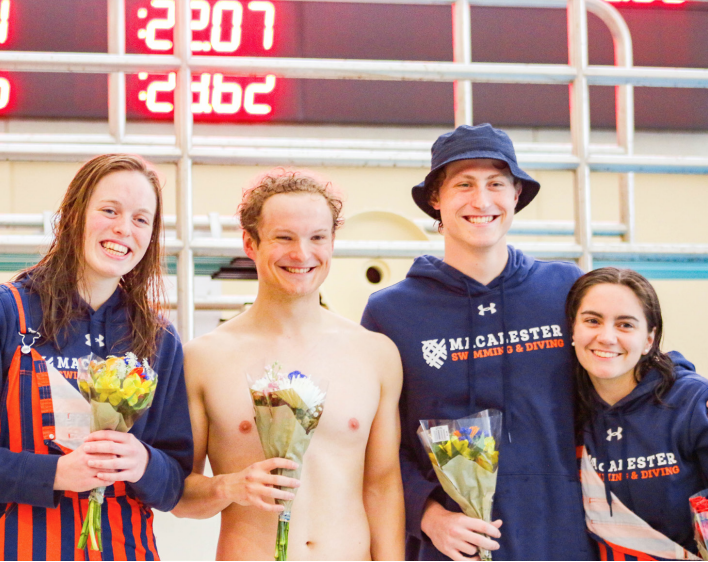
After Rachel Rostad ’15 posted a video of herself performing her slam poem, “To JK Rowling, from Cho Chang,” on Tumblr, she received a much larger response than she had ever anticipated. The poem critiques the portrayal of Asian characters in media, specifically pointing to the character of Cho Chang in the Harry Potter series. Over 200,000 Youtube hits later, I sat down with Rostad to discuss life after her video went viral.
The Mac Weekly: What was the most unexpected part of this poem’s internet release?
Rachel Rostad: The controversy of it! This piece was not considered “high risk” [by the slam poetry team]. I didn’t think of it as controversial. I’ve performed it and gotten really great scores, people had only ever approached me positively and I got great audience responses, plus at CUPSI they awarded me “The Best of the Rest” for it. I put it on Tumblr because I thought, “People like Harry Potter and social justice, so maybe they will think this is cool.” And then it blew up.
How many hits have you gotten?
Currently over 200,000 on Youtube, plus my response video has maybe 40-50,000. It’s small change if you’re looking at “Charlie bit my finger” or a Justin Bieber video, but for a slam poem it’s pretty significant.
What were the responses like?
It’s been mostly positive, which I try to keep in mind, because on the other hand there has been a lot of backlash. Most of the backlash is about a misleading punchline about Chinese surnames and Korean surnames, which was my fault for framing it that way when I was writing the joke, and I’m currently rewriting it. It made me really think of the slam poetry audience…if you’re in a room full of people who are all cheering about a poem, and you’re like, “Wait I don’t agree with this,” in some ways the internet allows you more of a voice. So slams are actually kind of conforming environments, which I hadn’t really thought about before.
How do you feel about getting so much attention?
I have mixed feelings. There are some people saying some pretty horrible things in the comments sections [of Youtube and Tumblr]. I try not to take it personally because they’re not really based on a legitimate critique, more things like, “Oh my god, what a stupid angry ‘insert slur here’!” Those don’t bother me, although it’s very sad to see that because at Macalester we’re pretty sheltered and it’s easy to forget that sort of thing exists…So that’s been jarring.
Has that changed how you view slamming in general?
The poem has reaffirmed both those negative ideas I have of slam as well as opened my eyes to positive impact that slam can have. There are a lot of things I question about the art of slam poetry—that it’s angry, that it’s exploitative, that it relies just on shouting and then getting high scores because people just agree with you—all of those things I worry about came to the forefront in the last few weeks. I think there’s this idea that when you go to a slam there’s all those buzz words like “dialogue” and “community building” and “social impact” and “art for social change” and when you look at what a poetry slam does, does it really do that? I don’t know. But when people are emailing me from Australia, and Singapore and France—it’s cool to see that slam poetry can have an impact beyond the small audience that sees it in person.
Why is it important to look at issues like race, gender and class in fiction?
I think a lot of people think that fiction, like “Harry Potter,” operates on this separate plane from reality and nothing can be problematic about it because it’s just for kids. But where do most of our perceptions of the world come from? It comes from the media we consume, whether it’s the news or “Jersey Shore” or “Harry Potter.” I think it’s very important to critique society through pop culture, because it really influences your world view.
Any final words?
I think that when you get on stage as a slam poet, or as an activist in general, you have to put yourself out there as knowing all the answers, because otherwise people aren’t going to listen to you. But that’s kind of the irony because that’s not how change happens. That way, it just becomes a debate where people are trying to poke holes in each other’s arguments because everyone’s setting themselves up as the authority. So what I’ve learned is to see social justice as a process, one that you are always learning from, and you make mistakes. And I’m learning.





Nicholas Campbell • Sep 11, 2019 at 10:36 am
Hello. remarkable job. I did not expect this. This is a splendid story. Thanks!
Samantha Russell • Sep 10, 2019 at 5:15 am
Terrific paintings! That is the kind of information that are supposed to be shared around the internet. Disgrace on the search engines for not positioning this put up higher! Come on over and talk over with my site . Thank you =)
Simon Ogden • Sep 7, 2019 at 10:07 am
Perfect work you have done, this site is really cool with superb info .